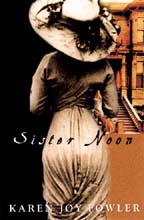| Karen Joy Fowler On Historical Fiction
I like settings I'm unfamiliar with, places I haven't been. I think of this as a cheap form of travel and if my imagination is traveling, why not let it time travel as well? The unfamiliarity of my surroundings is a source of energy as I write. Discarded science, outlandish medical and housekeeping practices, strange figures of speech and stranger clothes keep me attentive to setting and interested in my own imaginary story. When I think about contemporary settings I can feel my energy flag. I love the reading I do disguised as research. I allow myself to follow-up anything that intrigues me even when I know I won't be using it. Last year, while studying San Francisco, I read the autobiography of Aimee Crocker.* You might put down a book in which a spirited heiress describes her escapes from the machinations of mesmeric dwarfs and amorous headhunters just because it doesn't suit your immediate needs. I will not. I do my research and then, because I'm writing fiction, sometimes I fudge things. In my first novel, Sarah Canary, I alluded to a newspaper article about Belle Starr that actually came out about eight months too late, because I wanted to make a cheap penis joke. There's the price of my historical integrity -- eight months for one penis joke. Surely the writers of historical fictions are made of sterner stuff. But now we come to my most recent novel, Sister Noon. Sister Noon was a balancing act. From beginning to end I struggled to keep the historical background from overwhelming the fictional foreground. Actual historical figures appear in this foreground. They do and say things the real people did not do and say. More confusing, they also do and say things the real people did do and say. And I must concede, under cross-examination, that I could have simply changed the names of my historical figures, and that I didn't want to do so. Apparently fiction was not the only thing I was after. Yet a significant part of my rewriting involved removing pages and pages of fabulous historical data, because it didn't sufficiently impact on my fictional characters. Apparently history was not really my goal either. So I've inched closer, but I still don't think I've arrived at historical fiction. Thomas Mallon, himself a writer of wonderful historical fictions, says that a noun always trumps an adjective, and that historical fictions are fictions, first, and historical, only second. I would argue that my work falls to the fictional side even of that. In the end perhaps this is nothing but a pointless argument about definitions. My books are full of historical details, but I've always believed that readers will know which parts I made up and which parts I didn't. Give or take eight months. I could be wrong. Feel free to ask. Here's the part where I get to recommend three books. I've chosen three with historical settings that are not, to my mind, historical fictions. But all are incredibly, unbelievably good:
|
|||||||



* Aimee Crocker, And I'll Do It Again, Coward McCann, 1936
Author Photo by Shannon Fowler.

 I'm often asked what kind of books I write. I often answer that I like historical settings. This is a dodge, and a lame one; you'd think I could come up with something better. I don't say that I write historical fiction, though people usually think that's what I mean, because I'm not using the tools of fiction to examine history; I'm not attempting to intimately imagine true events. Instead my stories are entirely fictional and merely take place in the past.
I'm often asked what kind of books I write. I often answer that I like historical settings. This is a dodge, and a lame one; you'd think I could come up with something better. I don't say that I write historical fiction, though people usually think that's what I mean, because I'm not using the tools of fiction to examine history; I'm not attempting to intimately imagine true events. Instead my stories are entirely fictional and merely take place in the past.


